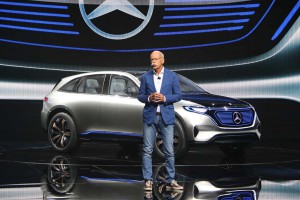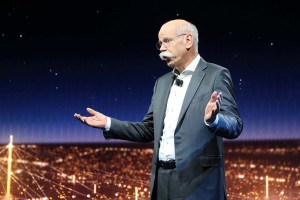
Daimler Chairman Dieter Zetsche said the company plans to build and sell the newly unveiled EQ brand of electric vehicles in China.
China will likely serve as the stage where the auto industry’s future plays out in the years to come, two key executives from Daimler AG told a Beijing Forum organized to discuss the future of the Chinese economy.
“The automotive industry is experiencing fundamental change: connectivity, autonomous driving, sharing and electric mobility. Each of these has the power to turn our entire industry upside down. And I truly believe: China can be ‘the turbo’ of this transformation,” Daimler AG CEO Dieter Zetsche told the forum as he outlined some of the key trends re-shaping the auto industry.
“Electric mobility, for instance, is developing quickly here. And we are aiming to further contribute to this development by planning to produce our new generation of electric Mercedes-Benz models also in China. We are committed to delivering innovation and believe to have a common target with our partners: a both sustainable and highly fascinating auto industry in China,” Zetsche noted.
Hubertus Troska, member of the Daimler management board responsible for China, added the automobile industry is on the cusp of a major transformation.
“The automotive industry is changing rapidly, perhaps nowhere faster than in China. Looking ahead, we will continuously innovate to bring Chinese customers new technologies, products and services, to shape the future of mobility through connectivity, autonomous driving, sharing and electric mobility,” Troska said.
(Mercedes may enter U.S. pickup market after all. To see more, Click Here.)

Daimler's Zetsche believes that China will be where automakers are most likely to put new technologies into play first.
“As China’s automotive industry continues its positive development in 2017, we, together with our partners, remain confident in the future of both the market here and our place in it,” he added.
Given the growing importance of electric drive in the Chinese market, local production of Mercedes-Benz passenger cars also includes the C350 e L plug-in hybrid model, and several imported plug-in hybrid models are also available in China.
The automaker is being forced to compete with other luxury automakers, such as Tesla to Volvo, when it comes to upscale EVs. Additionally, the lower end of the market will also soon be flooded with battery-electric options.
Daimler also has extended its NEV portfolio with the recent introduction of an upgraded model of DENZA, the company’s pure electric vehicle brand.
As the Chinese market holds great potential in the area of electric mobility, Daimler will continue to invest in R&D efforts to develop more efficient and environmentally friendly NEVs. The company is also planning to build EQ brand vehicles in China.
Troska, the executive Zetsche deputized to re-organize company operations in China more than four years ago, also noted that through its cooperation with strong local partners, Daimler has created the conditions for further growth with healthy and profitable dealer partners, additional production capacities, and a broader product range.
(Click Here for more about Daimler’s plans to open new Russia plant.)
China was the largest individual sales market globally for Mercedes-Benz Cars in 2016. This year, Daimler will continue to invest more in business innovations, further enhance customer experiences, and explore future strategies to address larger mobility needs, Troska said.
Two-thirds of the Mercedes-Benz passenger cars sold in China are manufactured locally.
Troska said critical to Daimler’s success in China has been an emphasis on the local research and development base, which currently employs 700 engineers and designers.
With its Chinese partner, BAIC, Daimler also continuously invests in local production. In 2016, the two companies agreed on the investment of €500 million in the further expansion of the Beijing-based engine plant.
Daimler remains committed to providing Chinese customers with innovative products and services in the fields of connectivity, autonomous driving, sharing and electric mobility. For instance, the new E-Class Long-Wheelbase launched last year in China marks a milestone on the road to autonomous driving, featuring an array of connectivity technologies and services tailor-made for local customers.
(To see more about Wolfgang Bernhard’s resignation from Daimler, Click Here.)
Daimler also was the first premium automaker to offer car-sharing in China. The free-floating car-sharing service car2go launched in Chongqing in April 2016.
